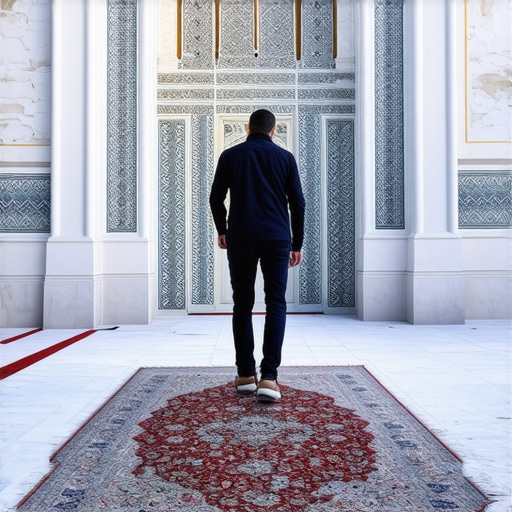The Enigmatic Significance of Losing Teeth in Islamic Dream Traditions
Dreams hold a profound place in Islamic spirituality, often interpreted as messages or reflections of one’s inner state. Among the most commonly reported and symbolically rich dreams is that of losing teeth. Far from a mere nightmare, this dream motif carries layers of meaning that intertwine personal, familial, and spiritual dimensions. Understanding the symbolism of losing teeth in Islamic dreams requires exploring classical Islamic dream interpretation sources alongside contemporary spiritual insights.
Teeth as Emblems of Life and Legacy: Why Their Loss Resonates Deeply
In Islamic dream literature, teeth often symbolize strength, family, and lifespan. The loss of teeth can metaphorically represent a fear of losing vitality or the passing of loved ones. For instance, Ibn Sirin, one of the most renowned Islamic dream interpreters, suggested that dreaming of losing teeth may indicate the impending loss of relatives or hardships within the family. This profound association underlines how teeth in dreams are not merely physical but deeply connected to one’s social and emotional bonds.
What Are the Varied Interpretations of Losing Teeth in Islamic Dream Context?
The interpretation depends significantly on the context and details of the dream. Losing upper teeth can be associated with the loss or illness of parents, while lower teeth might relate to siblings or children. The condition of the teeth (rotting, broken, or clean) also alters the meaning — clean teeth suggest honorable lineage or good fortune, whereas decayed teeth may warn of betrayal or misfortune. This nuanced understanding is essential for a faithful and accurate interpretation.
Spiritual Lessons Embedded in the Dream of Teeth Falling Out
Beyond familial implications, losing teeth in dreams can signal spiritual trials or the need for personal reflection. It may symbolize a cleansing process, shedding old habits, or confronting mortality. This aligns with broader Islamic teachings emphasizing self-accountability and preparation for the hereafter. The dream invites the dreamer to seek repentance, strengthen ties with family, and turn to Allah for guidance and protection.
Integrating Psychological and Islamic Perspectives for a Holistic View
Modern Islamic scholars often blend classical interpretations with psychological insights, recognizing that dreams can reflect both spiritual realities and subconscious anxieties. Losing teeth might express feelings of vulnerability, aging, or loss in waking life, which Islam encourages addressing through prayer and community support. This dual approach enriches the understanding and practical value of the dream.
For further exploration of similar dream symbols, including animals and other significant motifs, you might find valuable insights in our detailed interpretations of dreams about losing teeth in Islam.
Call to Reflection: Share Your Experiences and Insights
Have you or someone you know experienced the dream of losing teeth? What personal or spiritual transformations followed? Engage with our community by sharing your story or questions below. Your reflections enrich collective understanding and support others navigating similar dreams.
Authoritative Reference: For a comprehensive scholarly perspective, see the work of Ibn Sirin as documented in Islamic dream interpretation texts, such as “Tafsir al-Ahlam” by Muhammad Ibn Sirin, recognized as a foundational source in this field.
When Dreams Mirror Our Deepest Fears and Hopes
Reflecting on a personal experience, I once had a vivid dream where my teeth were crumbling one by one. It was unsettling, but it pushed me to think deeply about what was happening in my life. I realized I was going through a period of uncertainty and transformation, both emotionally and spiritually. This experience helped me appreciate how dreams about losing teeth can be intimate messages urging us to address hidden anxieties or changes.
How Does the Condition of Teeth Change the Dream’s Message?
One fascinating aspect I discovered is that the state of the teeth in dreams carries unique meanings. For example, clean, shiny teeth often symbolize honor and blessings, whereas decayed or broken teeth might warn of challenges or betrayal. This distinction resonates with Islamic teachings where purity and integrity are valued. When I explored this further, I found that the symbolism of losing teeth in Islam is layered and requires careful attention to such details, echoing the depth of traditional interpretations.
Could Losing Teeth in a Dream Be a Call for Personal Growth?
This question intrigued me because it moves beyond fear to opportunity. Dreams of losing teeth might not just predict loss but invite us to embrace personal renewal. They can signal the shedding of old habits or toxic relationships, urging spiritual cleansing and self-improvement. I found parallels in psychological research, like the works referenced by Islamic scholars, which suggest dreams help process our subconscious and promote growth. This holistic view enriches our understanding beyond mere symbolism.
Practical Steps to Reflect and Act on Such Dreams
After having such a dream, I started keeping a journal to note the details and my feelings upon waking. This practice made me more aware of my emotional state and helped me identify areas needing attention. Additionally, I turned to prayer and meditation, seeking guidance and strength. Such actions align with Islamic principles that encourage turning to Allah for support during trials, as highlighted in Islamic dream interpretations that emphasize spiritual reflection.
Sharing and Learning Together: Your Experiences Matter
I invite you to reflect on your own dreams about losing teeth or similar symbols. Have they sparked transformation or insight in your life? Sharing these experiences can create a supportive community where we learn from one another’s journeys. Feel free to leave your thoughts or questions in the comments below, and explore related topics to deepen your understanding.
For further insights, the classical texts like “Tafsir al-Ahlam” by Muhammad Ibn Sirin remain invaluable resources for anyone interested in the rich tapestry of Islamic dream interpretation.
The Intricacies of Teeth Condition: From Decay to Radiance in Dream Symbolism
The subtle nuances in the condition of teeth within dreams reveal an advanced layer of interpretation in Islamic dream symbolism. For instance, rotting or decayed teeth often symbolize spiritual or moral corruption, signaling the dreamer’s internal struggles or imminent challenges. Contrastingly, bright, shining teeth embody purity, honor, and favorable outcomes, reflecting divine blessings or familial prosperity. This distinction is not merely aesthetic but deeply rooted in classical texts, such as Muhammad Ibn Sirin’s Tafsir al-Ahlam, where the state of the teeth reflects the dreamer’s spiritual and social standing.
How Does the Number and Position of Lost Teeth Influence Islamic Dream Interpretations?
Delving deeper, the number of teeth lost and their placement in the mouth carry precise symbolic weight. Losing a single tooth might be interpreted as a specific loss or trial, such as the illness of a particular family member, whereas multiple teeth falling out could indicate widespread familial or communal hardship. Upper teeth traditionally relate to parents or elder relatives, while lower teeth correspond to siblings or children. Moreover, losing front teeth often suggests a more public or visible challenge, whereas the loss of molars might symbolize hidden or internal struggles. This granularity of detail enables a more personalized and context-sensitive interpretation that goes beyond generic analyses.
Psychospiritual Dynamics: Bridging Subconscious Fears and Divine Messages
Contemporary Islamic scholars increasingly emphasize the integration of psychospiritual perspectives into dream interpretation. Dreams of losing teeth can manifest subconscious anxieties about aging, vulnerability, or loss of control, which Islam encourages addressing through active spiritual engagement, such as prayer (du’a) and remembrance (dhikr). This dual recognition—acknowledging both psychological realities and spiritual symbolism—provides a holistic framework for understanding these dreams. As noted in the scholarly journal Islamic Studies, such integrative approaches enrich the interpretative tradition by situating dreams within lived human experience and divine guidance.

Advanced Interpretative Techniques: Using Contextual and Emotional Cues in Dream Analysis
Beyond the symbolic elements, the dreamer’s emotional state and the context of the dream play pivotal roles. For example, feeling fear, sadness, or relief upon losing teeth can significantly modify the interpretation. A calm acceptance might indicate readiness for change or spiritual growth, while panic could reflect resistance or unresolved issues. Additionally, the dream setting—whether surrounded by family, in solitude, or in a public setting—adds layers of meaning, pointing to relational dynamics or social implications. These advanced techniques underscore the importance of a tailored, empathetic approach to dream interpretation.
Can Dreams About Losing Teeth Serve as Catalysts for Spiritual Healing and Transformation?
Indeed, these dreams often act as profound catalysts for self-reflection and transformation. They compel the dreamer to confront fears, reassess relationships, and renew their commitment to spiritual disciplines. Engaging with such dreams through journaling, consultation with knowledgeable scholars, and prayer can facilitate healing and empowerment. This transformative potential aligns with Islamic teachings that view trials as opportunities for purification and growth. For further scholarly insights, exploring Ibn Sirin’s interpretations alongside modern psychological frameworks is highly recommended.
Invitation to Engage: Reflect and Share Your Interpretations and Experiences
We encourage you to delve deeper into your dreams about losing teeth—consider the details, emotions, and contexts—and share your insights or questions. Such exchanges foster a richer communal understanding and support spiritual development. For those seeking personalized interpretations or scholarly guidance, consulting trusted Islamic dream interpreters can provide clarity and reassurance.
Authoritative Reference: For an in-depth treatment of the symbolic and spiritual dimensions of teeth in dreams, refer to Muhammad Ibn Sirin’s Tafsir al-Ahlam, as well as contemporary analyses published in peer-reviewed journals such as Islamic Studies.
Unraveling the Symbolic Layers of Teeth Loss in Islamic Dream Traditions
Dreams of losing teeth in Islamic contexts are laden with multifarious layers of symbolism that transcend mere fears of physical decay. They represent a complex interplay of spiritual, familial, and psychological dimensions, demanding an expert eye for nuanced interpretation. Such dreams invite the dreamer to reflect not only upon imminent changes but also on deeper spiritual states and relational dynamics.
Discerning the Significance of Teeth Loss Through Number, Position, and Condition
In Islamic dream exegesis, the precise number and location of lost teeth are critical to decoding the dream’s message. For instance, the loss of a single upper tooth may portend an individual familial challenge, whereas multiple lower teeth falling out often denote broader communal or internal struggles. Teeth condition—ranging from pristine whiteness to severe decay—further modulates the symbolic message, signaling either divine favor or latent moral challenges. This layered symbolism underscores the necessity for contextualized interpretation rather than superficial readings.
How Can Emotional and Environmental Contexts Enhance the Accuracy of Teeth Loss Dream Interpretations?
Emotions experienced during the dream—such as tranquility, fear, or resignation—significantly influence interpretative outcomes. A calm demeanor amidst teeth loss may indicate spiritual readiness or acceptance of change, whereas anxiety could reflect unresolved psychological conflicts. The dream’s setting, whether within familial confines or public arenas, adds another interpretive dimension, highlighting relational or societal concerns. Incorporating these emotional and contextual cues enhances interpretative precision and aligns with Islamic scholarly traditions emphasizing empathy and holistic understanding.
Integrating Psychospiritual Insights: Bridging the Subconscious and Divine Guidance
Contemporary scholarship advocates for an integrative approach that melds classical Islamic dream interpretation with psychospiritual analysis. This framework recognizes that dreams about teeth loss often encapsulate subconscious fears—such as aging, vulnerability, or loss of agency—while simultaneously conveying divine messages urging spiritual vigilance and growth. Engaging in reflective practices like dhikr (remembrance) and du’a (supplication) empowers the dreamer to navigate these symbolic messages effectively.
For a rigorous academic exploration of such integrative approaches, consult the peer-reviewed article Dreams and Spiritual Experience in Islamic Tradition published in Islamic Studies, which thoroughly examines the symbiosis of psychological and theological dimensions in dream interpretation.
Advanced Methodologies for Dream Reflection and Spiritual Empowerment
Practitioners seeking to harness the transformative potential of teeth loss dreams are advised to maintain detailed dream journals that capture sensory details, emotional tones, and contextual factors. Coupling this practice with consultation from learned Islamic scholars or certified dream interpreters enhances interpretative clarity and spiritual insight. Such engagement fosters healing, encourages repentance, and facilitates personal growth aligned with Qur’anic exhortations.

Invitation to Deepen Your Dream Interpretation Journey
We invite you to immerse yourself in the profound symbolism of teeth loss dreams by examining your own experiences through the advanced interpretative lenses presented. Sharing your reflections or seeking expert guidance can cultivate a supportive community and deepen your spiritual journey. Join the dialogue below and contribute to the collective wisdom surrounding this enigmatic dream motif.
Authoritative Reference: Muhammad Ibn Sirin’s seminal work Tafsir al-Ahlam remains the cornerstone of Islamic dream interpretation, complemented by contemporary psychospiritual research published in Islamic Studies.
Frequently Asked Questions (FAQ)
What does losing teeth in an Islamic dream generally symbolize?
In Islamic dream interpretation, losing teeth often symbolizes significant changes related to family, health, or spiritual states. It may indicate the loss of relatives, personal trials, or a call for spiritual renewal and reflection. This symbolism is deeply rooted in classical texts like Ibn Sirin’s Tafsir al-Ahlam, where teeth represent strength, lineage, and vitality.
How does the position of the lost teeth affect the dream’s meaning?
The position of the lost teeth is crucial. Upper teeth typically relate to parents or elder relatives, while lower teeth signify siblings or children. Losing front teeth might suggest visible or public challenges, whereas molars often relate to hidden struggles. This positional symbolism helps tailor interpretations to the dreamer’s familial and social context.
What role does the condition of the teeth play in interpretation?
The state of the teeth—whether clean, decayed, broken, or shining—modulates the dream’s message. Bright, healthy teeth can indicate honor, blessings, or good fortune, while decayed or broken teeth may warn of betrayal, moral challenges, or spiritual difficulties. This nuance reflects the importance Islam places on purity and integrity.
Can emotions experienced in the dream influence its interpretation?
Absolutely. Dream emotions such as fear, calmness, or sadness add interpretative layers. Calm acceptance may suggest readiness for change or spiritual growth, while panic or distress could indicate unresolved anxieties or resistance. These emotional cues provide a holistic understanding in line with Islamic scholarly traditions.
Is dreaming about losing teeth a sign of impending misfortune?
Not necessarily. While some interpretations associate it with loss or hardship, many scholars emphasize its potential as a catalyst for spiritual reflection and personal growth. The dream often urges the dreamer to seek repentance, strengthen family ties, and engage in prayer, transforming fear into empowerment.
How can one practically respond to such dreams in an Islamic framework?
Practices include maintaining a detailed dream journal, performing du’a (supplication), engaging in dhikr (remembrance of Allah), and consulting knowledgeable Islamic scholars for personalized interpretation. These steps align with Islamic principles encouraging self-accountability and spiritual vigilance.
Do modern psychological perspectives align with traditional Islamic dream interpretations?
Modern Islamic scholars often integrate psychological insights with classical interpretations, recognizing dreams as reflections of subconscious fears or emotional states alongside divine messages. This synthesis enriches understanding and supports holistic spiritual wellbeing.
Are there specific Islamic texts recommended for deeper study on this topic?
Yes, the seminal work Tafsir al-Ahlam by Muhammad Ibn Sirin is foundational. Additionally, contemporary peer-reviewed articles, such as those published in the journal Islamic Studies, explore the intersection of psychology and spirituality in dreams, offering advanced interpretative frameworks.
Can sharing dreams about losing teeth help in spiritual growth?
Sharing and reflecting on such dreams within a supportive community can foster collective understanding and spiritual empowerment. It encourages empathy, diverse perspectives, and reinforces the Islamic ideal of mutual support in navigating life’s trials.
What should one avoid when interpreting dreams about losing teeth?
One should avoid overly simplistic or fear-driven conclusions without context. Dream interpretations require careful consideration of details, emotions, and personal circumstances. Consulting qualified Islamic scholars ensures interpretations remain authentic and beneficial.
Trusted External Sources
- Tafsir al-Ahlam by Muhammad Ibn Sirin: The classical cornerstone of Islamic dream interpretation, offering detailed symbolism and spiritual insights, especially on teeth and familial motifs.
- Islamic Studies Journal: A peer-reviewed academic publication featuring rigorous research on Islamic theology and spirituality, including integrative studies on dream interpretation and psychospiritual dynamics.
- International Association for the Study of Dreams (IASD): Although not Islamic-specific, IASD provides scientific and cross-cultural research on dream symbolism that complements Islamic interpretative traditions.
- Al-Azhar University Publications: Renowned for authoritative Islamic scholarship, offering contemporary analyses and fatawa on spiritual practices related to dreams and psychological wellbeing.
- Qur’anic Tafsir Collections: Various tafsir texts elucidate thematic links between dreams, spiritual trials, and divine guidance, enriching contextual understanding for dream interpretation.
Conclusion
Dreams about losing teeth hold a uniquely layered place within Islamic symbolism, intersecting familial bonds, spiritual challenges, and psychological realities. Through classical sources like Ibn Sirin’s Tafsir al-Ahlam and contemporary psychospiritual scholarship, we uncover a rich tapestry of meaning where each detail—the number, position, and condition of teeth, as well as the dreamer’s emotions and context—contributes to nuanced interpretation. Far from mere ominous signs, these dreams often serve as profound invitations for self-reflection, repentance, and renewal aligned with Islamic teachings. Engaging with such dreams through journaling, prayer, and community dialogue empowers believers to navigate life’s transformations with faith and insight. We encourage readers to share their experiences and explore related expert content, fostering a vibrant, supportive discourse on this deeply significant dream motif.



This post offers a comprehensive exploration of the symbolism behind losing teeth in Islamic dreams, which I find deeply fascinating. From my own experience, I once dreamt of losing my front teeth and woke up feeling unsettled, prompting me to reflect on my current life circumstances. The connection between dreams and spiritual states becomes clear through this detailed analysis. I particularly appreciate the emphasis on the condition of the teeth and how it can represent moral or spiritual integrity. It makes me wonder, how do others interpret dreams where the teeth are not only lost but also damaged or decayed? Could such details indicate specific areas of moral challenge in one’s life? I believe sharing and discussing these nuances can greatly enhance our understanding and encourage spiritual growth.
This post provides a rich and detailed insight into the symbolism of losing teeth in Islamic dreams, highlighting how deeply intertwined our subconscious can be with spiritual and familial themes. I recall experiencing a similar dream where my teeth shattered, which left me contemplative about the state of my personal integrity and relationships. The nuanced interpretation about teeth conditions—like decay or shining—and their spiritual implications resonated with me, prompting deeper reflection. I wonder, in your experience, how do dreams of losing teeth differ when they involve emotional reactions such as fear or calmness? Do these emotional responses influence the severity or positivity of the message conveyed? I believe such personal nuances are essential in understanding our dreams’ true messages. Sharing these detailed personal reflections might help others see the relevance of their own dreams within their spiritual journey and daily lives.
This article really deepened my understanding of the symbolism behind losing teeth in Islamic dreams. I recall a dream where I lost a lower tooth, and it was quite vivid, prompting me to reflect on my family ties and personal growth. It’s fascinating how such dreams can serve as signals for real-life spiritual and emotional states. The connection between the condition of the teeth—like whether they are decayed or shining—adds an additional layer of interpretation that I hadn’t fully appreciated before. I wonder, in your view, how do emotional reactions during these dreams—such as fear versus calmness—shape their meaning? Can these feelings influence whether the message is more about warning or encouragement? Sharing personal experiences of these dreams might help others interpret their own more accurately, especially when combined with emotional context. I’d love to hear how others have integrated these dreams into their spiritual journeys.
Reading this detailed post truly helped me see how dreams about losing teeth are so much more than just fear or loss—they are intertwined with our spiritual and emotional well-being. I once had a dream where I lost several teeth, and I remember waking up feeling quite anxious about my future. Over time, I came to realize that such dreams can serve as subtle calls for self-reflection, especially if the condition or location of the teeth was notable. I’ve also noticed that my emotional response during the dream—whether fear or calmness—seems to influence my interpretation of what I should focus on spiritually or emotionally. Has anyone else observed how their reactions during these dreams impact their subsequent understanding or actions? I believe that recognizing these inner responses is key to connecting the dream’s message with personal growth. It’s inspiring to see such profound insights encouraging us to reflect deeply and seek Allah’s guidance.
This post has truly opened my eyes to how layered the symbolism of losing teeth can be within Islamic dream interpretation. I remember once dreaming that my teeth were falling out, and I felt a mixture of fear and reflection upon waking. It made me consider what internal struggles I might be avoiding or the need to seek spiritual renewal. I appreciate how the article emphasizes the condition, position, and emotional tone during these dreams, as these details seem crucial in understanding their real message. I wonder—how do you think the cultural background influences the way such dreams are interpreted or the actions taken afterward? Does a person’s personal context affect whether they see these dreams as warnings or opportunities for growth? Sharing experiences about how these dreams have impacted personal spiritual practices could be very enlightening for our community. I look forward to hearing others’ insights and experiences on this fascinating topic.